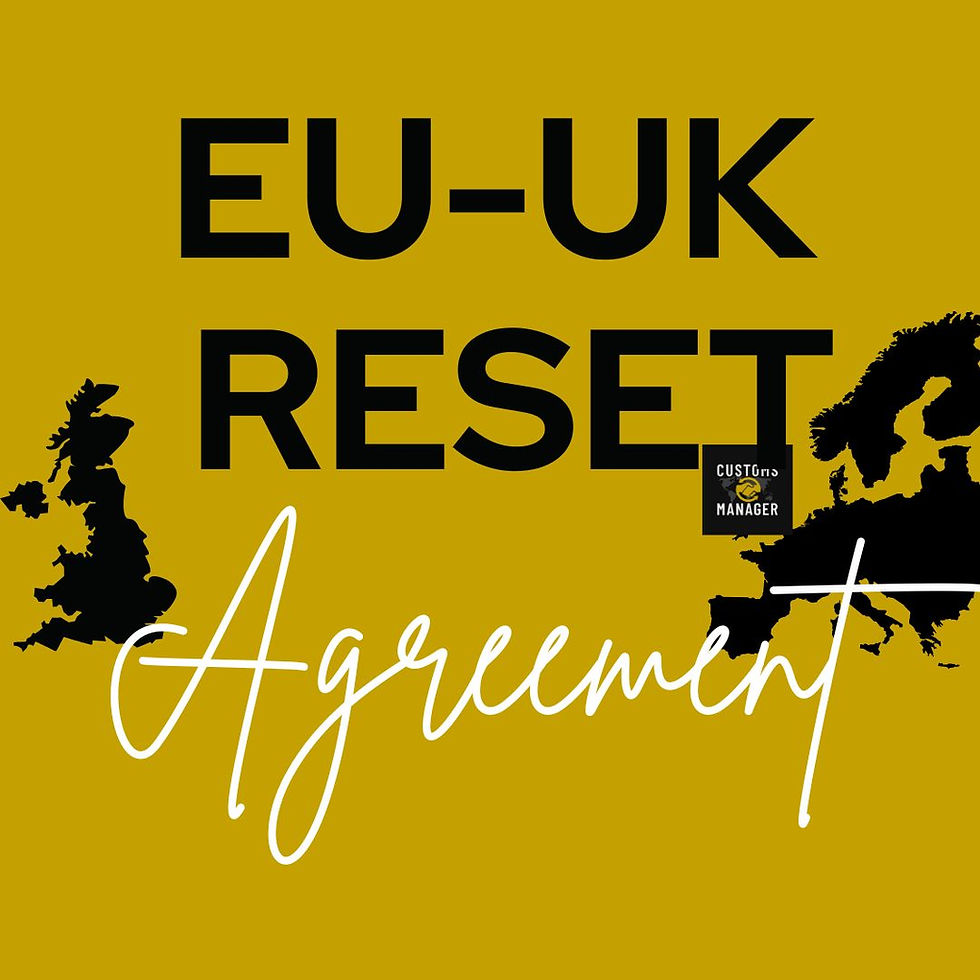UK-EU Reset: What Comes Next?
- Arne Mielken
- Jun 19, 2025
- 4 min read
Can the UK and EU turn political will into tangible customs and trade agreements? Let's map the road ahead.

The recent UK-EU Summit on May 19 marked a shift in tone, if not yet in binding commitments.
As a Customs Consultant deeply involved in EU, UK, and US matters, I see this as a pivotal opportunity to address the fractured trade framework post-Brexit. The summit hinted at a return to collaboration. But will intent translate into actionable, detailed customs, import regulations, and trade compliance agreements?
Key Questions Covered in This Blog
What does the May 19th UK-EU summit signal for customs professionals?
How might SPS alignment change import and export processes?
What is the future of dynamic alignment in regulatory standards?
Will the UK rejoin key EU frameworks like REACH and ETS?
Can pharmaceuticals, chemicals, and electricity sectors benefit from this reset?
Is a UK-EU customs union or shared VAT regime on the horizon?
What institutional changes are needed to make this happen?
Abbreviations Used In This Blog
SPS: Sanitary and Phytosanitary
REACH: Registration, Evaluation, Authorisation and Restriction of Chemicals
ETS: Emissions Trading Scheme
TCA: Trade and Cooperation Agreement
ECJ: European Court of Justice
EMA: European Medicines Agency
"This summit was not just about symbolism—it was a call to rebuild trust, legal certainty, and trade confidence for businesses across the Channel."Arne Mielken, Managing Director, Customs Manager
Fancy a Call?Let’s discuss how this affects your business. Book your free session at www.customsmanager.org -> Book Expert Call |
Get Weekly Game-Changing Updates with The Customs Watch EU & UKStay informed with compliance alerts, tariff changes, and negotiation updates. Sign up at www.customsmanager.info |
What did the May 19th UK-EU summit signal for customs professionals?
The summit marked a critical shift. No longer stuck in post-Brexit defensiveness, the UK signaled openness to deep integration with EU structures, particularly in customs and regulatory cooperation. For customs professionals, this wa the first genuine opportunity in years to see simplified import and export procedures—if the political will holds.
How might SPS alignment change import and export processes?
Aligning with EU SPS rules could end years of red tape, especially for agri-foods and animal products. The UK’s commitment to dynamic alignment—i.e., adopting all future updates—would mean predictability for traders. Border delays, veterinary checks, and paperwork could sharply decline, particularly for Northern Ireland trade flows.
What is the future of dynamic alignment in regulatory standards?
The term "dynamic alignment" once triggered Brexit-era political alarms. Now, it's being reframed as a business necessity. Dynamic alignment in customs and compliance matters ensures a consistent framework, which is essential for trade professionals managing cross-border risk. A strong dispute resolution system, likely ECJ-referenced, would further increase certainty.
Will the UK rejoin key EU frameworks like REACH and ETS?
The REACH and ETS frameworks represent high-value sectors. Chemicals and carbon-intensive industries have suffered from regulatory divergence. Rejoining or aligning closely with EU REACH and ETS not only reduces duplication but allows UK firms to participate in EU supply chains again. The economic logic is compelling; political commitment is now required.
Can pharmaceuticals, chemicals, and electricity sectors benefit from this reset?
Absolutely. UK biotech firms need EMA access and mutual recognition of standards. Chemicals trade is blocked by REACH dual registration burdens. Electricity trading inefficiencies raise energy prices. These are solvable issues—if both sides move fast. Customs consultants and trade compliance officers should already be preparing for change.
Is a UK-EU customs union or shared VAT regime on the horizon?
Both are back on the table. Though politically sensitive, a shared VAT regime could be a first practical step—easing burdens on UK SMEs and smoothing access to EU markets. A customs union would go further but needs political appetite. For now, groundwork is being laid: assessments, cost-benefit studies, and scenario planning.
What institutional changes are needed to make this happen?
Without machinery, vision dies in committee. The UK needs a beefed-up Brussels Mission and Cabinet Office taskforce. The EU must also dedicate legal and technical staff. These aren’t “nice-to-haves.” They’re prerequisites for success. If you work in trade compliance, watch for signs that such resourcing is materialising—it’ll signal seriousness.
Arne’s Takeaway
We are at a fork in the road. The May 19th summit may not have delivered legal agreements, but it revived trust. For customs professionals and compliance officers, this is the moment to prepare. Align your procedures, scan the horizon, and get ready for accelerated regulatory integration.
Expert Recommendations
Map your exposure: Identify where SPS, REACH, and VAT rules affect your supply chain.
Engage your contacts: If you work with EU customs brokers or regulatory agents, start dialogue now.
Audit your compliance systems: Make sure you're ready for dynamic alignment processes.
Sources & Further Information
UK-EU Summit Political Declaration, May 19, 2025
European Commission Press Release on SPS Talks
UK Government Statement on Regulatory Alignment
Sign up for sector-specific alerts and premium webinars at www.customsmanager.info
Disclaimer This blog is for educational purposes only and does not constitute legal advice. Please consult a legal or customs professional for guidance specific to your situation.










Comments